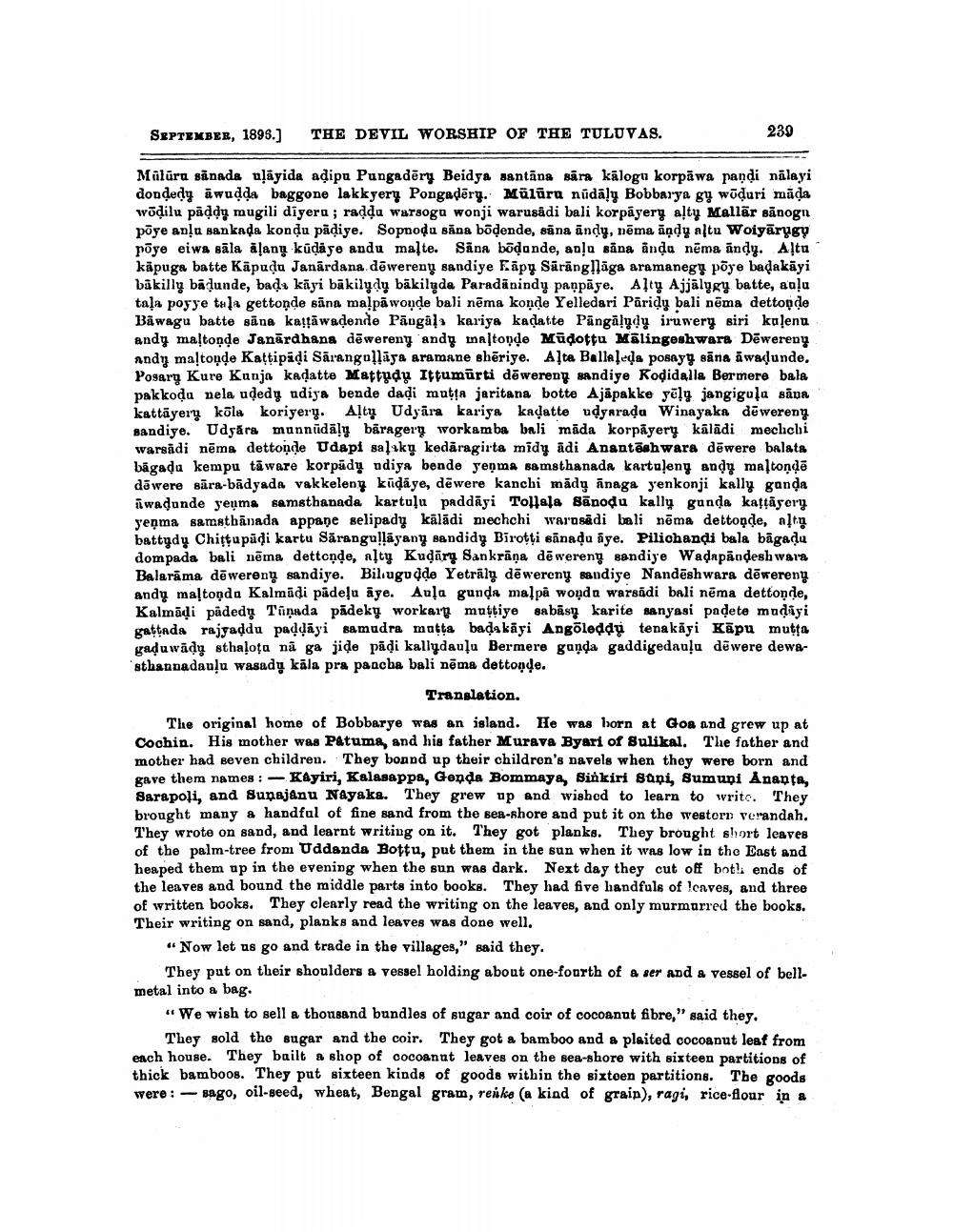________________
SEPTEMBER, 1896.)
THE DEVIL WORSHIP OF THE TULUVAS.
239
Mülūra sänada nļāyida adipo Pungadēry Beidya santāna sāra kālogu korpāwa pandi nalayi dondedy awudda baggone lakkyery Pongadēry. Mülūru nūdāly Bobbarya gy wõduri māda wõdilu paddy mugili diyera ; radda warsogo wonji warusādi bali korpāyery alty Mallār sānogn pöye anļu sanknda kondu pādiye. Sopnoda sāna bödende, sāna undy, nēma āņdy nltu Woiyārygy pāye eiwa sāla alang kudaye andu malte. Sana bödande, anļa sana anda nēma āndy. Aļtu" kāpuga batte Kāpuda Janārdana dēwereny sandiye Kāpy Sārānglāga aramanegy pöye badakāyi bâkilly badunde, badı kāyi bākilydų bākiląda Paradānindų paņpāye. Altų Ajjälygų batte, aolu tala poyye tula gettonde sana malpā wonde bali nēma konde Yelledari Päridy bali nēma dettop de Bawagu batte sāna katāwadende Pāngāļa kariya kadatte Pāngālydų iruwery siri kolena andy maltoņde Janārdhana dēwereny andy maltoņde Mūdottu Mālingeshwara Dēwereny Andy maļtoņde Kattipidi Sārangoļlāya aramane shēriye. Alta Balleleda posayy sāna āwadunde. Posary Kure Kunja kadatte Mattudy Ittumārti dēwereny sandiye Kodidalla Bermere bala pakkoda nela udedy ndiya bende dadi mutta jaritana botte Ajāpakke yēly jangigola sāna kattāyeru kõla koriyery. Alty Udyāra kariya kadatte udyarada Winayaka dēwereny Bandiye. Udgara munnudāly bāragery workamba bali māda korpāyery kālādi mechichi warsādi nēma dettonde Udapi salaky kedāragirta midy ādi Anantēshwara dēwere balata bāgada kempu tāware korpädų udiya bende yenma samsthanada kartaleny andy maltondo da were sāra-bĀdyada vakkeleng kūdāye, dēwere kanchi mady anaga yenkonji kally ganda iwadande yenma samsthanada kartuļu paddĀyi Tolala sānodu kally ganda kațāgery yeņma samsthāvada appane selipadų kālādi mechchi warus di bali nēma dettonde, alty battydy Chittupādi kartu Sārangullāyang sandidy Bīrotti sānadu aye. Pilichandi bala bāgadu dom pada bali nēma dettonde, alty Kudārg Sankrāņa dēwereng Bandiye Wadapāndeshwara Balarama dēwerenų sandiye. Bilugudde Yetrāly dēwereny sandiye Nandēshwara dēwereny andy maltonda Kalmüdi pädelu aye. Aula gunda malpā woyda warsādi bali nema dettonde, Kalmādi padedy Tinada pādeky workait mattiye sabāsy karite sanyasi padete mudiyi gattada rajyaddu paddayi samudra motta bad, kāyi Angöleddy tena käyi Kāpu mutta gadu wady sthalota na ga jide pāļi kallydauļu Bermere ganda gaddigedauļu dēwere dewasthannadauļu wasady kāla pra pancha bali nēma dettoyde.
Translation. The original home of Bobbarye was an island. He was born at Goa and grew up at Cochin. His mother was Patum&, and his father Murava Byari of Sulikal. The father and mother had seven children. They bondd up their children's navels when they were born and gave them names : - Kayiri, Kalasappa, Genda Bommaye, Sinkiri sani, Sumuni Ananta, Sarapoli, and Sunsjanu Nayaka. They grew up and wished to learn to writo. They brought many a handful of fine sand from the sea-shore and put it on the western verandah. They wrote on sand, and learnt writing on it. They got planks. They brought short leaves of the palm-tree from Uddanda Bottu, put them in the sun when it was low in the East and heaped them up in the evening when the sun was dark. Next day they cut off bot!i ends of the leaves and bound the middle parts into books. They had five handfuls of leaves, and three of written books. They clearly read the writing on the leaves, and only murmurred the books. Their writing on sand, planks and leaves was done well,
"Now let us go and trade in the villages," said they.
They put on their shoulders & vessel holding about one-foorth of a ser Add a vessel of bellmetal into a bag.
"We wish to sell a thousand bundles of sugar and coir of cocoannt fibre," said they.
They sold the sugar and the coir. They got a bamboo and a plaited cocoanut leaf from each house. They built a shop of cocoanut leaves on the sea-shore with sixteen partitions of thick bamboos. They put sixteen kinds of goods within the sixtoen partitions. The goods were : - sago, oil-seed, wheat, Bengal gram, reike (a kind of grain), ragirice flour in a




